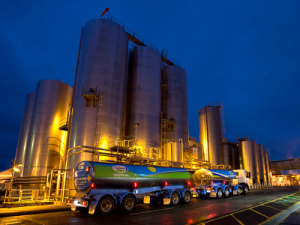Battle for milk
OPINION: Fonterra may be on the verge of selling its consumer business in New Zealand, but the co-operative is not keen on giving any ground to its competitors in the country.
 Marlborough farmer Murray Beach has submitted a remit for Fonterra’s board meeting next week, proposing a new share system.
Marlborough farmer Murray Beach has submitted a remit for Fonterra’s board meeting next week, proposing a new share system.
Marlborough farmer Murray Beach wants a new share system for Fonterra.
Beach has submitted a remit for Fonterra’s board meeting next week, proposing a new share system.
His proposal says that Fonterra must initiate, within three months, a formal co-op wide discussion regarding the existing share system.
Beach is proposing a new share system that will “make all suppliers equal”.
However, the Fonterra board and Shareholders Council oppose the proposal. Fonterra shareholders are now voting on the proposal and the results will be announced at its annual meeting in Lichfield next week.
Beach says when Fonterra stopped paying redemption to farmer shareholders leaving the co-op, “it left outsiders to buy up those shares from the people jumping ship”.
“This has caused the same amount of shares to be out there but the value-add pool has decreased due to the loss of milk,” Beach says.
“So the shares are staying the same and the value-add pool is decreasing through loss of milk and will continue to do so unless we change the system to stop people leaving.”
Beach questions what will happen if Fonterra loses 15% milk supply over the next 5 to 10 years? This could put Fonterra down to 65%, he says.
“That’s pretty scary with 21,400 employees and the same overheads. I can’t see that lending towards high milk prices.
The problem is the high share price, it encourages people to leave. The second problem is there are too many shares.
“If we fix the share price, it stabilises the price, it can’t go up or down, so it stabilises your security as well. You know exactly where you are from year to year. The issue is, are you milking cows or playing a share market?”
Under Beach’s proposal for example, if a farmer has 100,000 shares at $5.50, worth $550,000, he proposes changing these to $2 shares, giving the farmer 275,000 $2 shares.
The farmer must keep 100,000 shares worth $2.00. These could be called his milking quota shares.
This farmer still has 175,000 shares worth $2.00 that he can sell or transfer. We’ll call these his saleable/transferrable shares. The saleable/transferable shares can only be sold to a Fonterra farmer.
If the farmer increases production by 10,000 Milk Solids, he can transfer 10,000 of his saleable/transferable shares to his milking quota shares.
This will give him 110,000 milking quota shares and reduce his saleable/transferable shares to 165,000.
The outsiders’ shares, known as the units could be changed to$2.00 shares and the dividend will have to be honoured on them.
All existing schemes, 6 years to share up, 10 years to share up, contract milk and MyMilk to be replaced by the $2 share over a period of time, say 3 years.
These can be bought from any farmer wishing to sell some of his saleable/transferable shares. Beach believes his proposal has the support of many shareholders.
The latest Global Dairy Trade auction results have delivered a boost to dairy farmers.
New Zealand potato growers are prioritising value creation from high yields to meet a complex mix of challenges and opportunities, says Potatoes NZ chief executive Kate Trufitt.
A Hawke's Bay apple orchardist supports the Government's objective of doubling exports but says this won't happen in the horticulture sector unless there's a change in the process for bringing new plant material into the country.
Canterbury arable farmers are down by tens of millions of dollars after a rollercoaster of wild changeable January weather saw harvests delayed and some crops destroyed by violent hailstorms.
Could a breakthrough in fermentation create a new multi-million-dollar export market for shiitake mushroom extracts into China?
Meadow Fresh has created the world's first fantasy sports league powered by real cows.
OPINION: Fonterra may be on the verge of selling its consumer business in New Zealand, but the co-operative is not…
OPINION: What does the birth rate in China have to do with stock trading? Just ask a2 Milk Company.